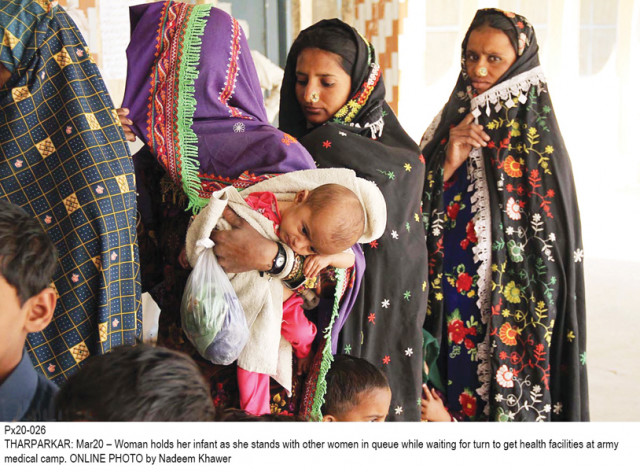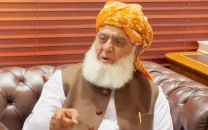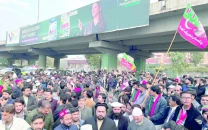Thar drought: SC suggests making community service mandatory for doctors
Apex court bench hears Thar drought suo motu case on Thursday.

Women and children queue up outside the Army medical camp in Thar. Doctors unwilling to serve in Thar and its adjoining areas is proving to be one of the biggest challenges faced by the health department, the SC was told on Thursday. PHOTO: ONLINE
The apex court bench, comprising three members, said the government can make it compulsory for final-year medical students to serve in Thar and other remote areas for at least six months before they are awarded their professional degrees. The issue of the lack of medical facilities and doctors arose when a three-member bench took up the suo motu case on the recent deaths of over 100 children in Tharparkar.
Health secretary Iqbal Hussain Durrani informed the judges that he had posted 25 doctors immediately after the disaster took place. “But, only nine of them have reported because the rest of them are not willing to serve in the rural areas,” he said.
One of the bench members, Justice Khilji Arif Hussain, remarked that most of the government doctors posted in Mithi are in Karachi by paying half of their salaries to the medical superintendents as bribe. The health secretary admitted that the doctors are not willing to serve outside Karachi but they’ve been issued show-cause notices. Chief Justice of Pakistan Tassaduq Jillani observed the primary healthcare system was very weak in the rural areas due to a lack of the spirit to serve the community.
Earlier, the director-general for the Provincial Disaster Management Authority told the judges that they had received a letter from the World Health Organisation, warning of a possible drought in Sindh.
Chief secretary Sajjad Saleem Hotiana replied they had taken effective measures. CJ Jillani concluded that the incompetence of officers was the main factor behind the current situation in Thar. The bench directed the chief secretary to file, within a week, a report on the causes of the drought in Thar and what measures the irrigation department would suggest in the long term.
Published in The Express Tribune, March 21st, 2014.


















COMMENTS
Comments are moderated and generally will be posted if they are on-topic and not abusive.
For more information, please see our Comments FAQ